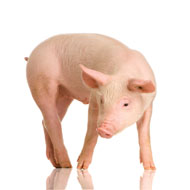Defra clarifies position on pig tail docking

"Pig farmers need to demonstrate at inspections that tail docking has been used as a last resort..."
Defra’s position on tail docking has been clarified, after an increasing number of pig producers are being penalised for the practice.
Routine tail docking is not permitted under EU law and may only be carried out when there is evidence of tail biting and all other measures to prevent this have been attempted.
At a recent National Pig Association (NPA) meeting, attendees heard about the case of a producer in the south west, who was handed a five per cent reduction to his BPS payment for tail docking. NPA said it understands court proceedings have been threatened in some cases.
Duncan Berkshire, president of the Pig Veterinary Society (PVS), explained: “This is about routine tail docking without all measures possible to prevent tail-biting being evident in the pens, including the provision of manipulable materials.”
Asked to clarify its position, a Defra spokesperson said: “Routine tail docking is not permitted by law. Pig farmers need to demonstrate at inspections that tail docking has been used as a last resort after taking the necessary steps, as described in the current welfare codes, to reduce the risks of tail biting. This includes actions to improve the pigs’ environment and their management.”
One of the concerns, according to Mr Berkshire, is that inspectors appear to have different interpretations of how producers are addressing the issue, with some regional variation reported.
The NPA said it is working actively to address the situation, collaborating with other parties to bring greater clarity to producers.
NPA chief executive Zoe Davies said: “We advise producers to do all they can to assess what would need to be done before they could stop tail docking, and to record any evidence. But we need to work more closely with Government to manage the transition more carefully and sensibly.
“Our concern is that producers will be panicked into not tail docking when previously there was no tail biting problem and create a much worse situation.”
NPA has set up a tail docking working group comprised of government, industry and academia to develop a joint approach to reduce tail docking.
Defra also consulted on a new statutory pig welfare code, which would provide more detailed information on the different factors causing tail biting, and advice on how to prevent it without docking tails. It is currently analysing the responses.



 The Animal and Plant Health Agency (APHA) has updated its online reporting service for dead wild birds.
The Animal and Plant Health Agency (APHA) has updated its online reporting service for dead wild birds.